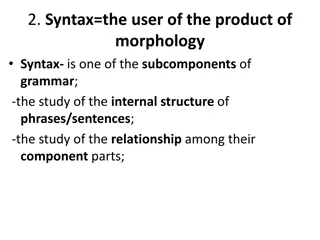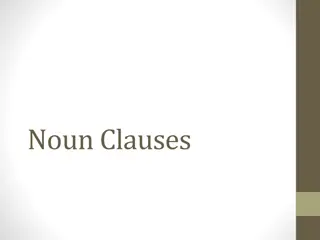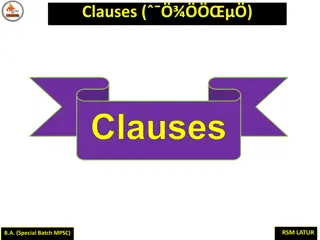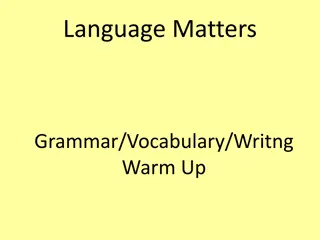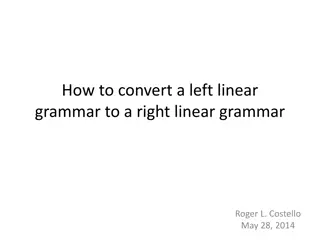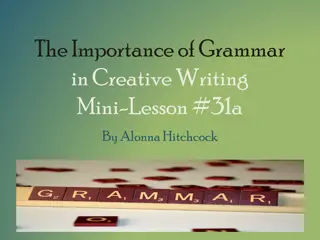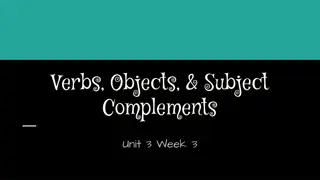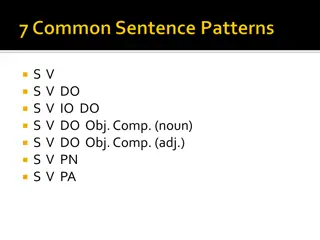Understanding Complements in Grammar
The word "complement" originates from Latin meaning to fill up or complete and is essential in completing the meaning of a verb. Complements can be a noun, pronoun, or adjective but never an adverb. They are never found in a prepositional phrase. Learn about direct objects, indirect objects, and predicate nominatives to enhance your understanding of grammar.
Download Presentation

Please find below an Image/Link to download the presentation.
The content on the website is provided AS IS for your information and personal use only. It may not be sold, licensed, or shared on other websites without obtaining consent from the author. Download presentation by click this link. If you encounter any issues during the download, it is possible that the publisher has removed the file from their server.
E N D
Presentation Transcript
The word complement comes from the Latin word complere which means to fill up or complete . Complements COMPLETE the meaning of a verb.
A complement can be a noun, a pronoun, OR an adjective.
An adverb is NEVER a complement. ADVERB The package is here. [Here is an adverb that modifies the verb by telling WHERE the package is.] COMPLEMENT The package is heavy. [Heavy is an adjective that makes the sentence a COMPLETE thought.]
A complement is never in a prepositional phrase. PREP. PHRASE Erin is painting in the garage. (The prep. phrase in the garage is an adverb phrase telling where Erin is painting.) COMPLEMENT Erin is painting her room. (The noun room completes the phrase by telling what she is painting.)
Direct Object: a noun, pronoun, or word group that tells who or what receives the action of the verb; must come after an action verb Ex: I met Dr. Mason. (I met whom? I met Dr. Mason. Dr. Mason receives the action of the verb met.) Try: Please buy fruit, bread and milk. D.O. =______________________________
Indirect Object: a noun, pronoun, or word group that sometimes appears in sentences containing direct objects; tells to whom or to what, or for whom or for what, the action of the verb is done Ex: The waiter gave her the bill. (The pronoun her is the indirect object of the verb gave. It answers the questions To whom did the waiter give the bill?) Try: Did she tip him five dollars? I.O. = ___________________________________
Predicate Nominative: a word or word group in the predicate that identifies the subject; a noun or pronoun that is connected to the subject by a linking verb [Common linking verbs: appear, be, become, grow, remain, smell, stay, be, feel, look, seem, sound, taste] Ex: A dictionary is a valuable tool. (Tool is a predicate nominative that identifies the subject dictionary.) Try: The discoverers of radium were Pierre Curie and Marie Curie. P.N.= ___________________
Am, are, is, was, were, and, be Forms of be, forms of be Taste, smell, sound, seem , look, feel , say Become, grow, appear, remain
Predicate Adjective: an adjective that is in the predicate and describes the subject; connected to the subject by a linking verb Ex: Cold milk tastes good on a hot day. (Good is a predicate adjective that describes the subject milk.) Try: How kind you are! P.A. = __________________________________
Direct Object: After action verb Noun or pronoun Answers Who? Or What? Indirect Object: After action verb, before Direct Object Noun or pronoun Answers To whom? Or To what?
Predicate Nominative: After linking verb Noun or pronoun Equal to the subject Predicate adjective: After linking verb adjective Describes the subject
Find Subj. & Verb Action Verb Linking Verb Are there any Nouns or Pron. after V? What is the subject equal to? Yes? Does it answer Whom? What? = D.O. Noun = PN No? No D.O. Adj.=PA To whom or what? For whom or what? = I.O.
Transitive verbs have direct objects Intransitive verbs have NO direct objects
Find Subj. & Verb Transitive Intransitive Action Verb Linking Verb Are there any Nouns or Pron. after V? What is the subject equal to? Yes? Does it answer Whom? What? = D.O. Noun = PN No? No D.O. Adj.=PA To whom or what? For whom or what? = I.O.




